“That’s How it Was” | Introduction | Wychwood Women : The Interviewees | Declaration of War | The Arrival of Evacuees| School Time | Preparing for War at Home | Soldiers and Airmen | For the Common Cause | Dr Scott and the Canteen | Domestic Life | We Were Lucky Out Here: Food Rationing | Work for Women Outside the Home | The Effects of War
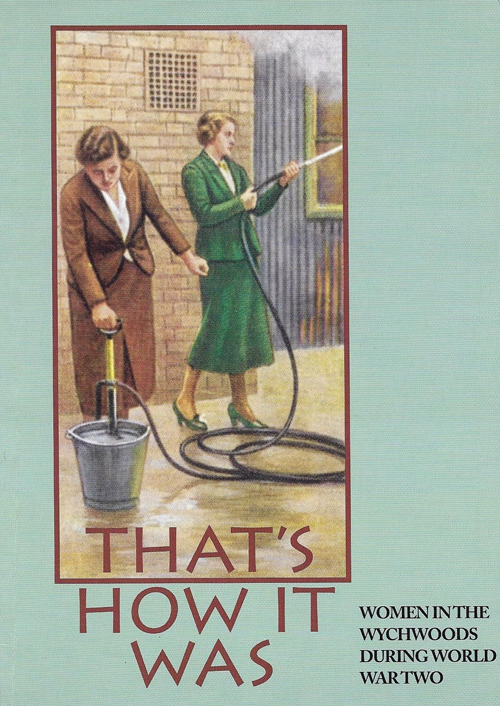
… from the Wychwoods “That’s How It Was” Publication
With the outbreak of war, girls had to take some sort of employment helpful to the war effort with National Service beginning at 18 years. Many took over occupations previously dominated by men. Irene Carpenter, Dorothy Treweeke and Peggy Coombes were all sent to work here as Land Army girls, (and ended up finding husbands too).
Irene Carpenter nee Groom was born in Burton on Trent on 25 October, 1925. She joined the Women’s Land Army in 1943, leaving her job in an arts and craft studio. She spent part of the war at Shipton Court Farm where she worked with the herd of Jersey cows owned by Mrs Hall. The milk was sent to Oxford.
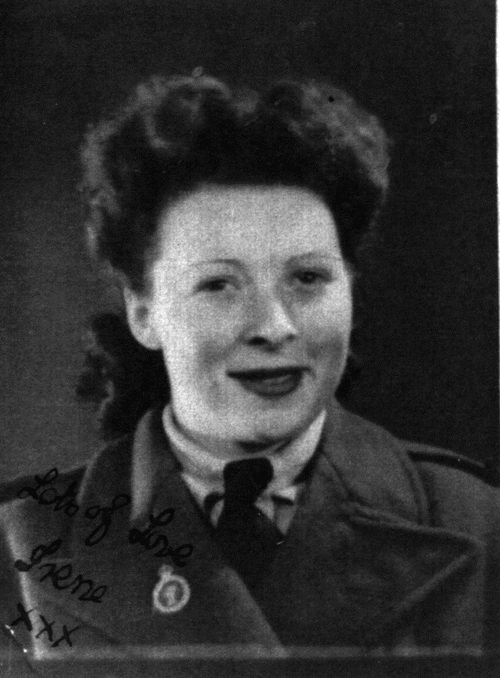
‘I got the papers and Dad had to sign them because I was too young and then went to Reece Heath Agricultural College in Nantwich. It was a quick course, a little bit of everything, horses, pigs, butter making, hand and machine milking and a little bit of horticulture. I was sent down to a farm round the Iffley area outside Oxford.
I did the milking but then they put me in the dairy which was very heavy work because we did have these seventeen and half gallon churns which you had to tip to get the milk out to put it in the cooler. I didn’t like it very much; I was half starved. Then I went to Mrs Hall’s to do the milking. She lived in Mawles Lane but most of the girls were billeted in Springhill Cottages. The farm was on the other side of the road, Home Farm Close now. I should imagine it was about 80 milkers, lovely little cows. We very often used to walk them up to the top of the Swinbrook Road crossroads, to graze up there and of course somebody had to stay with them because you had to go round to see they didn’t eat too much and “blow” ‘. Irene Carpenter
Living conditions were basic but while at Shipton she had to surrender her ration book in exchange for having all her food provided and served at the bothy in the stables at Shipton Court.
‘Money was taken for our keep, and I think it was about 7s 6d we had left, but we was a happy lot, we didn’t fall out much’.
Irene later moved to farms at Glympton and Wilcote. She had, however, met her future husband, Ramsey Carpenter, at the Red Horse while working in Shipton and they married at St Mary’s Church, Shipton in 1946.
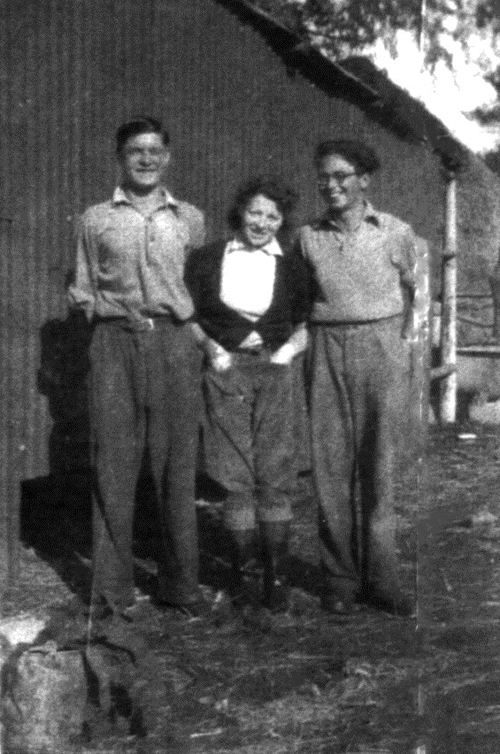
Dorothy Treweeke nee Parr left her office job in Cleckheaton near Bradford at the age of seventeen and joined the Women’s Land Army as her parents refused to sign the forms for her to join the WAAF. Her first job after training in Northampton was on Earl Spencer’s farms potato picking.
She was there for eighteen months and then went on to work in the cowsheds and then looking after the calves, pigs and chickens on other farms. However Dorothy’s mother was taken ill and she had to return home. By September 1944 she was keen to get away again.
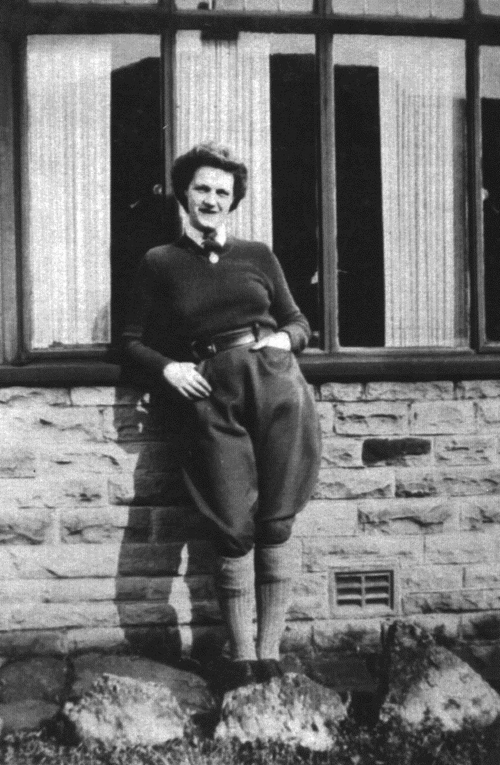
‘So I asked for a transfer and was sent to Hill Crest, to work for Norman’s father. Up the Bruern Road they lived. I had come to drive the tractor. He had chickens; he used to rear them and sell the eggs or incubate the eggs and when the chicks were so many days old, we used to take them down to Shipton Station and send them to different people because they were a pedigree – I can’t remember – Plymouth Rock, I think.
I was helping with those in the morning and then I used to go up to Foxholes and do the tractor driving, ploughing and harrowing. He rented it from Miss Bailey. Norman’s father taught me how to drive, yes in Foxholes, I never had a driving test. He showed me what to do and I just drove round and round the field and them one day he said, ‘Do you think you could manage to go down home and get something?’ and I did.
But you see there was nothing on the roads in those days and you didn’t meet anybody because the private cars you couldn’t get petrol for, it was only the farmers. They were quite hard times really, the haymaking was one and the threshing, when we threshed you used to get caught up with the sheaves, they used to scratch your arms, it was quite heavy really. But no, I really enjoyed it’. Dorothy Treweeke
After the war she married Mr Treweeke’s son Norman and they took over the milk round from Mr Davis.
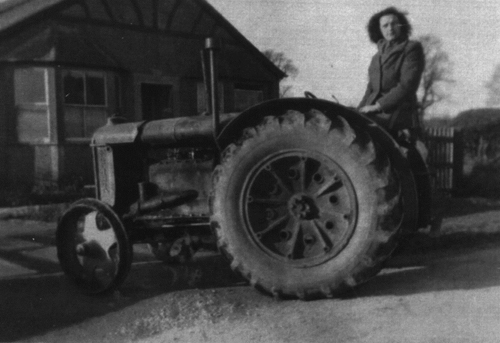
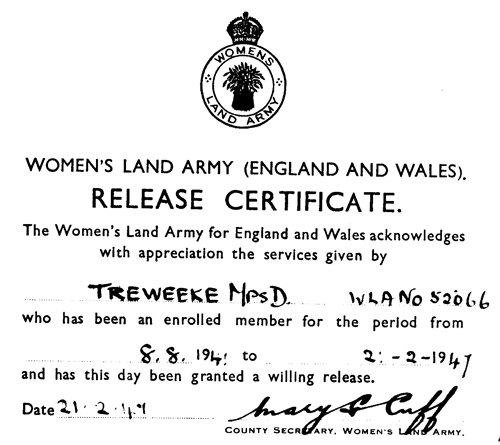
Peggy Coombes was living on the outskirts of Bristol when war was declared.
‘I was working in a drawing office at the Bristol Aeroplane Company at Fulton. Very interesting work but it did not really satisfy me in some way or other. So when I had the chance to join the Land Army I jumped at it.
Actually I had an awful job to get out because it was a protected occupation. But I made myself such a nuisance that they let me go. At the beginning we were very lucky, we went to college so we weren’t absolutely ignorant when we got to the farms like some of them were. This was in July 1940, about six weeks but it was very intensive.
We did a bit of everything – over 60 of us, all sorts and nationalities. I went to Somerset to start with. We were given one pair of dungarees and one pair of breeches and one shirt to start with and you had to give up coupons for anything else you wanted. So when you wanted your breeches washed you had to wear either your own slacks or skirt.
I remember the first winter I had chilblains on my knees. We were paid 28s a week and we had to give up 14s to the farmer’s wife for our keep and if we did overtime we were paid 7d an hour.
And the first farm I went to I started by washing the cows at half past five in the morning, worked until half past 7 at night, clearing up the dairy after they had bottled the milk and when I asked for my 7d overtime I was told to find another job.
This was a very large dairy, over 150 cows. I suppose it was about 18 months altogether that I was dairying. And then the girl I joined with who lives locally as well [Mrs Griffin at Fifield] she was on an arable farm and her farmer wanted another girl. So I came to Gloucestershire and ended up at Gawcombe.
Tetbury was all horse, ploughing with three horses but at Gawcombe it was tractors. I was not a tractor driver – [I would] ride the drill, that sort of thing, harvest, hay making. I think farming is the most satisfying job you can possibly have; you see the end results’. Peggy Coombes
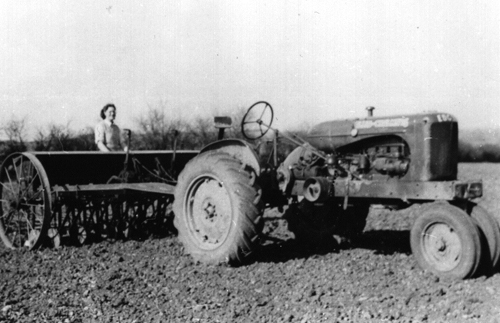
Peggy developed tonsillitis and had to leave the Land Army. She stayed on in Shipton and worked in the office at the F.W.P. Matthew’s mill. Like the other land army girls we interviewed who came to the Wychwoods area to work, she too met her future husband, Bob Coombes, here, at a dance organised by Dr Scott in the Beaconsfield Hall after the village fete.
These three land army girls came to the Wychwoods.
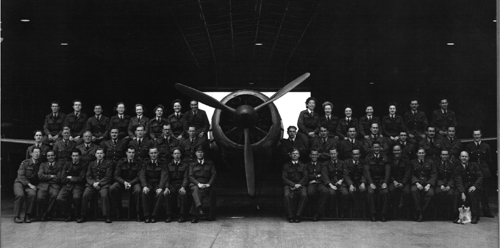
For Dorothy Harrison, born in Ascott in 1924, war service took her out of the area. She remembered her father helping to build and maintain the new RAF station at Little Rissington.
‘Father worked at No 8 MU [maintenance unit] at Little Rissington. He even helped to build it. They had a bus but, at first, he had to cycle there. He stayed there until he stopped work. He even did Home Guard duties there instead of back in the Ascott platoon’.
After school in Ascott, Dorothy had started work at 14. She was filled with enthusiasm at the prospect of war.
‘I was delighted. Honestly. I only wanted the war to go on long enough to join up- in the RAF. When the war began I was working at Yew Tree Farm, next door doing chickens and eggs and things like that. That’s why when I joined up he said, ‘It’s a reserved occupation’. He said that he had to sign a paper [to secure release] and he said he didn’t know [if he would]. I said, ‘Well, if you won’t sign I won’t work’.
I went to New Inn Hall Street in Oxford in 1942. Then I was posted to Innsworth Lane, Gloucester for square bashing and then came the hardest two years of my life. I did five years in the WAAF and the last three were a complete joy after the first two as a barrage balloon operator and that was no job for a woman, believe you me’.
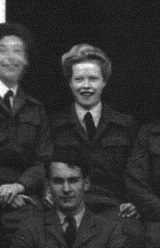
‘On the northeast coast above the Newcastle shipyards. We used to get bombed every night and if you didn’t get bombed there was a storm raging all night, and you pulled all night to hold the balloon in position. A terrible thing for a girl to do, it was very hard. On the northeast coast the balloons either got shot down or a storm ripped them off.
At 18 I was a corporal in charge of a balloon site in the East End of London and because we would not fly balloons as they were trying out other devices, for a month no shops would serve us and nobody would speak to us.
We were very close to people – sometimes stationed in someone’s garden, wherever the pattern was needed. On one occasion the girl next to me was killed by shrapnel when on duty in the East End. I was also on a site in the moat of the Tower of London.
Then after the bombing let up they did not need so many balloons so I re-mustered as an aircraft engine fitter. At the end of 1943 1 went to St Athan, South Wales. Then I was posted to RAF Croughton as an aircraft fitter and after 3 years to RAF Ternhill in Shropshire. After five years in the WAAF I went to Birmingham [to be demobbed] and then back to Ascott‘. Dorothy Harrison
In 1947 she married Sergeant Pilot Al Harrison, and after a working life with the Metropolitan Police, they returned to the Wychwoods, to Milton, in 1980.
Some local girls worked at RAF Little Rissington.
Betty Brown nee Duester, born at Kingham Hill in 1927, moved to the cottage at the end of Frog Lane aged three when her father was cowman at Lower Farm, Upper Milton. Later the family moved to a cottage at the far end of The Square when he became cowman at Little Hill Farm.
From here Betty attended Milton school and then Burford Council school. She began in domestic service for Brigadier General Kirby at Heath House, Lyneham Road, and then worked for a time at The Swan, Minster Lovell. By then the war had started and her only brother, John, had been called up. Rather than going away from home too, Betty went to work at No 8 Maintenance Unit, RAF Little Rissington at the age of 16.
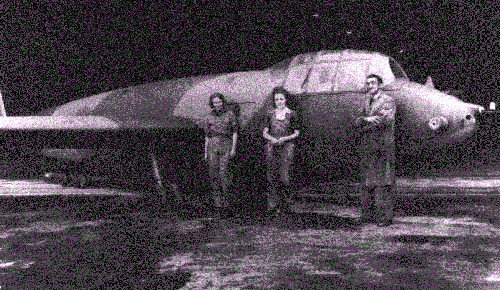
‘I was at the top hangar on the big Horsa gliders, the ones that took the troops, and then I moved to the bottom hangar. Here I worked on Spitfires that were sent to Malta. We only worked day shifts but when we were doing the Spitfires we had to work three Sunday shifts to get them ready. We did the modifications on them before they went back into use.
Some American Dakotas came to collect some of the small Hotspur gliders. I worked on those as well. We went to work by Air Force bus, all camouflaged. They went round all the villages. The men were riggers and fitters. We did the sort of rough work, putting on patches etc.
I am not sure if we dealt with crashed planes but they had a field of planes no longer in use, Wellington bombers. There were meals in the NAAFI but I always took sandwiches. We wore overalls as we were climbing all over the aircraft. Betty Brown
While at RAF Little Rissington Betty met Addy Brown who had been directed here from his native northeast of England. They were married in Milton in 1946 where Betty still lives.
Brenda Bishop nee Brewerton also worked at RAF Little Rissington. Born near Coventry, at 15 she came to live with her Milton grandmother and new husband, Wycliffe Dore, in Spring Cottage beyond the end of Green Lane.
After her grandmother died in 1938, Brenda lodged with Mrs Agnes Earley and worked as a van driver delivering milk for Poplar Farm, Milton. She passed her Goods Vehicle driving test, so women were beginning to go into such occupations even before the necessities of wartime made it more common.
‘As I was working for Mr Wells at Poplar Farm I stayed on till the war got under way. I delivered milk by van to all the villages but lived with Agnes Earley when Ken, her husband went to war work. Later I went to Little Rissington No 8 M.U. [Maintenance Unit] as an M.T.[Motor Transport] driver; I am not sure of the date that I started.
As there were only one or two people working at 8 M.U. at that time we went together with Roland who was given enough petrol to get to work. There were already two other female drivers working there; one to drive the test pilots and the other the top foreman. I was a heavy duty driver so had a truck and tractor to drive as was needed, the tractor to tow planes and the truck to haul equipment and personnel.
Soon others from around the three Wychwoods were getting work at 8 M.U. enough to run a bus to take us back and forth, and headquarters decided to take me off site and give me the C.O.’s car at headquarters, also a van to drive when needed for trips away from camp, London, Wales and in between. This was what I enjoyed most.
There were happy times and sad ones, like a plane crashing on the equipment store. It was at night after a raid and on its way back to base. So we all went ahead with our jobs until the war ended. There were quite a few MT drivers, about six women, the rest were men. I was just helping out the men’. Brenda Bishop
In her spare time she was busy with the Girl Guides, Keep Fit and amateur dramatics and later she served on the committees of the Comforts Fund and WI. In December 1946, Brenda left England for the United States where she now lives in Florida.
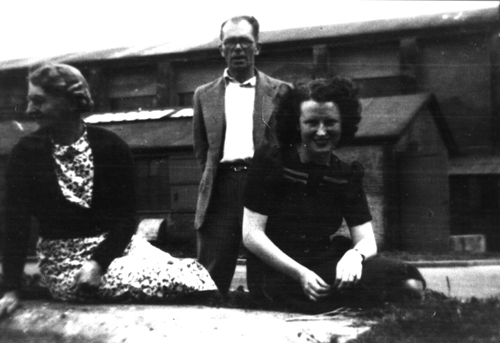
Cicely Miller nee Tibbitts was born in Maestag, South Wales in 1921 and came to the Wychwoods in 1932. Her father, gassed in the First World War, had gone to South Wales to find work. With difficult times in Wales her father then moved to Aylesbury to work in a brewery.
Following an illness attributed to war-time gassing, it was suggested he return to his native village. The family moved into 4 Pear Tree Close in 1931, the last of those new councils house to be occupied. Cis attended Burford Council school and then began work at Mrs Davis’ shop at London House, High Street, Milton. At outbreak of war, she helped her widowed mother with evacuees and then she was called up for National Service.
‘In the second year of the war, when I was 20, I was called up. So I went from Mrs Davis’ to the British Aluminium Company at Banbury. I think that I went down to Shipton to catch the bus, then lodged in Banbury during the week and then came home at weekends – if we weren’t working weekends’. Cicely Miller
After appendicitis Cis was unable to lift the heavy sheets of metal on to the machine so she was re-directed to Witney where De Havilands repaired crashed aircraft. In the early war years these were mainly Tiger Moths, an early training plane, but as the war progressed they repaired Spitfires and Hurricanes, the vital fighter planes.
‘At first I was in the stores and then moved to the stores’ office. I stayed at De Havilands to the end of the war. We worked six days a week, sometimes seven. I left Milton on the early bus which was utility with wooden slatted seats. It left Milton at 6.15am to arrive at Witney at 7.30am as we went all round the villages, Chadlington, Charlbury and the rest of them’. Cicely Miller
In her spare time she was in the Guides as well as being Brown Owl, amateur dramatics, keep fit and the Wychwood choir, as well as being a youthful member of the Wychwoods British Legion and Women’s Institute. At De Havilands she met John Miller who had been directed to De Havilands from Hampshire. They were married in 1948 and made their home at 4 Pear Tree Close where they still live.
“That’s How It Was” Menu
These pages are reproduced from the Society’s publication “That’s How It Was”, featuring women in the Wychwoods during World War Two. The texts and images were published in the year 2000, and deserve a place in our expanding online archive. Please bear in mind as you read our texts in these pages, that we reproduce them as published in the year of publication.
Select from:
“That’s How it Was” | Introduction | Wychwood Women : The Interviewees | Declaration of War | The Arrival of Evacuees| School Time | Preparing for War at Home | Soldiers and Airmen | For the Common Cause | Dr Scott and the Canteen | Domestic Life | We Were Lucky Out Here: Food Rationing | Work for Women Outside the Home | The Effects of War

